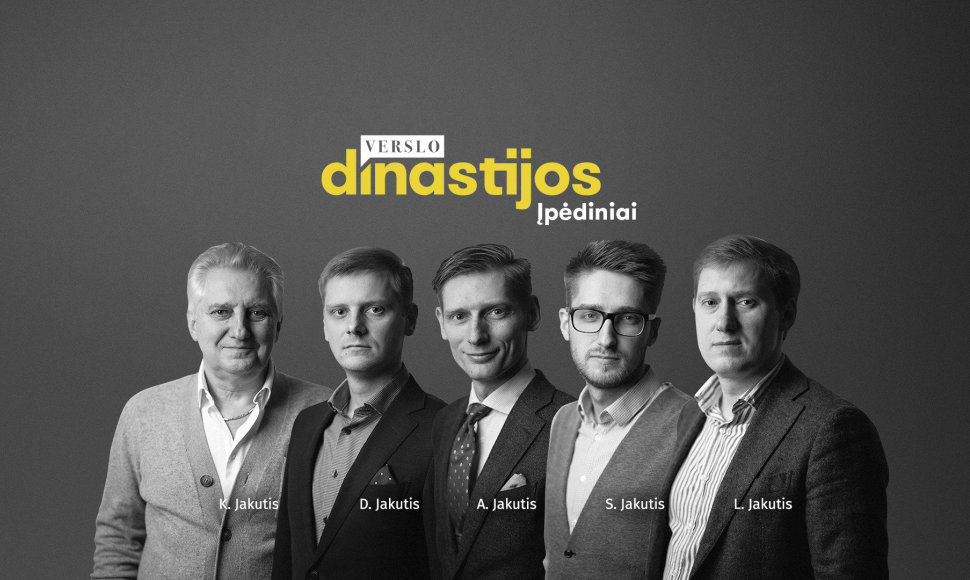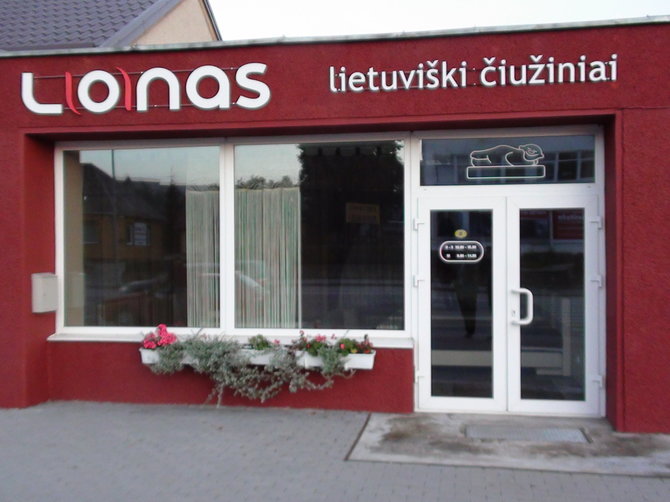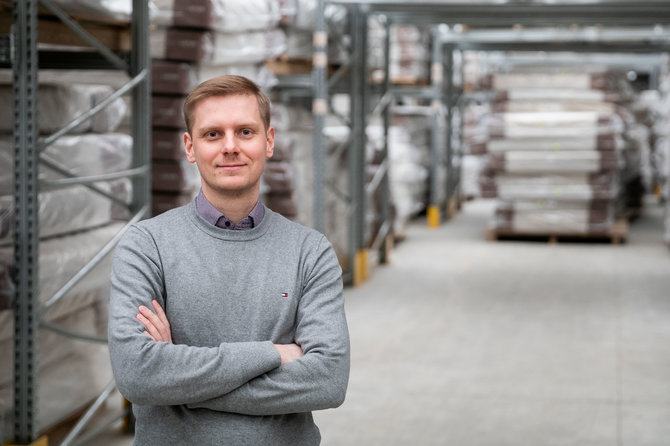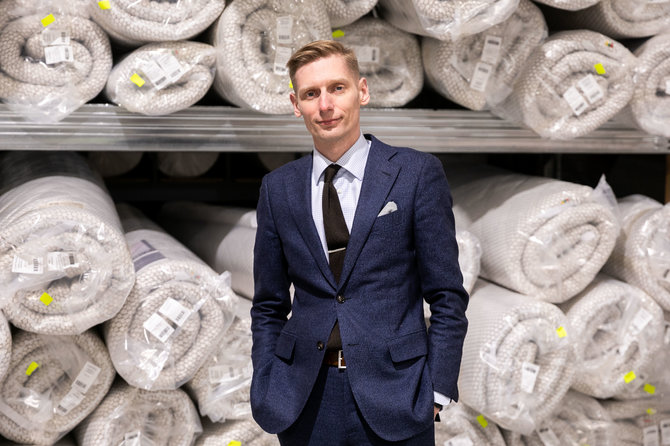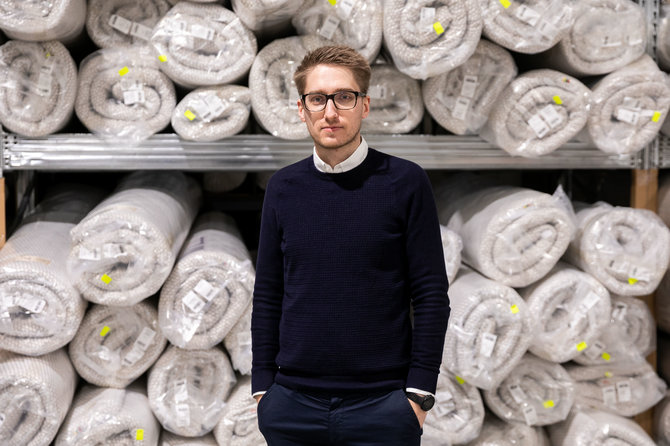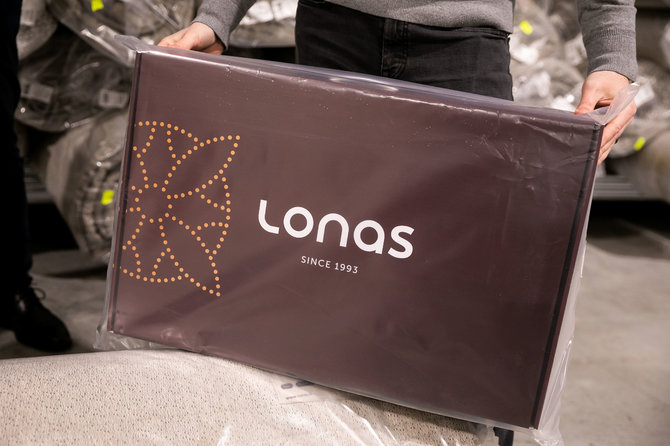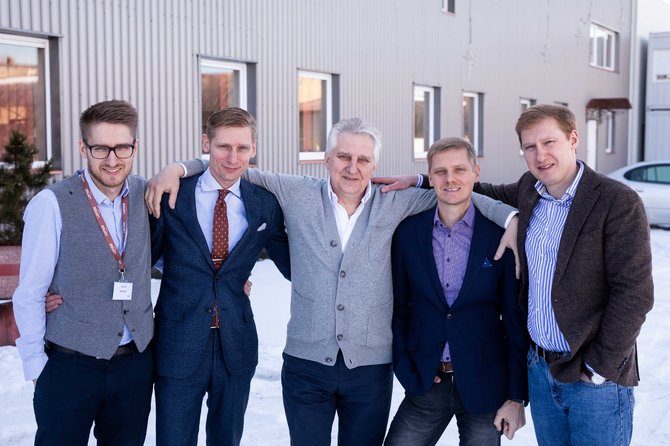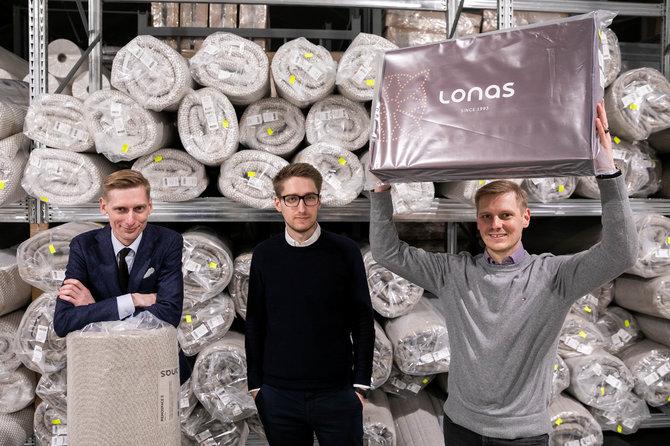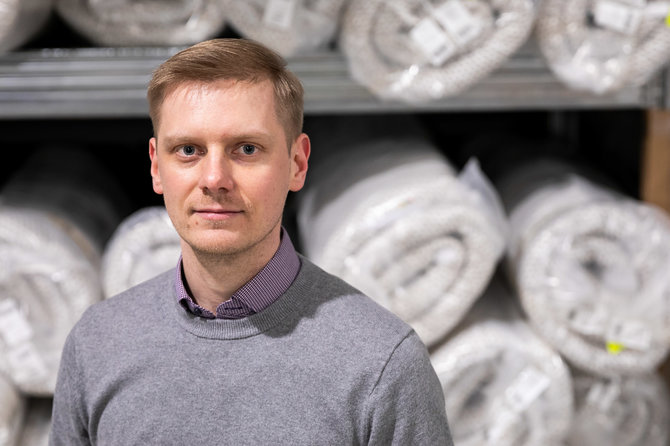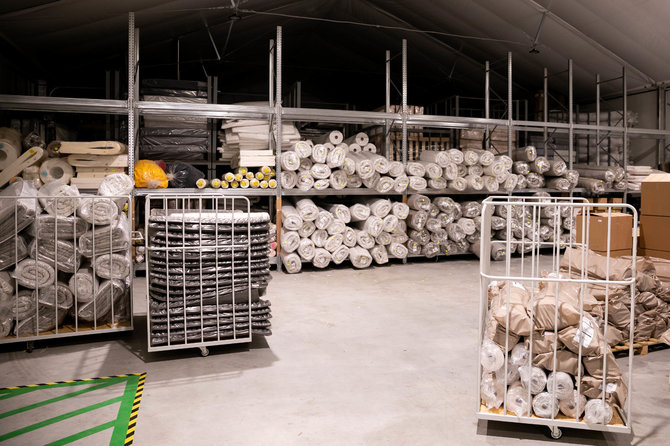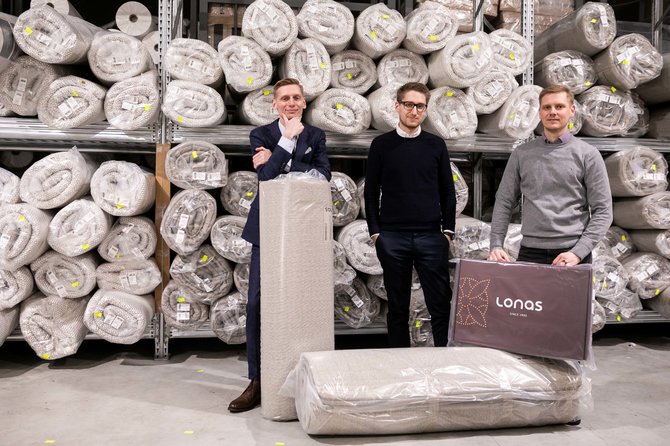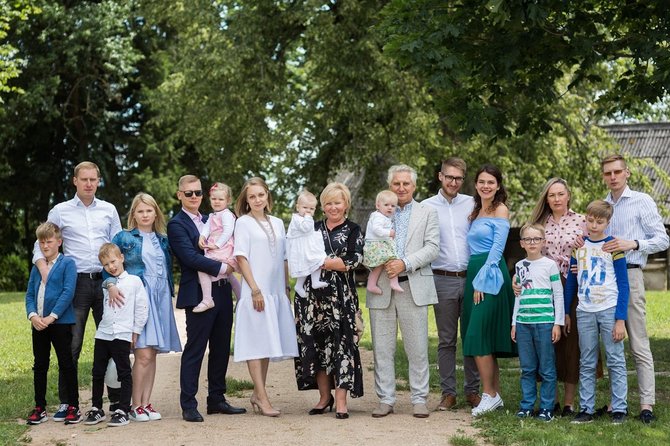Kazimieras Jakutis, founder of a Lithuanian bed and mattress manufacturing firm Lonas, would often repeat a simple truth to his four sons over dinner when they were little. Kazimieras, who is a musician in his spare time, would tell his offspring: do what you enjoy and the money will follow. Although none of the four sons – Adas, Liudas, Domas or Saulius – had originally planned to join the family business, gradually each discovered that their skills were best suited to grow and develop the enterprise started by their father.
Lonas Group
Sector: bedroom furniture, beds, mattresses
Turnover: consolidated turnover of 16.5 million euro in 2020
Number of employees: 220
Established: 1993
Founder: Kazimieras Jakutis
When Kazimieras Jakutis started his business in 1993, the firm employed only three people and traded in foam, sponges and mattresses. Five years later the company purchased a production facility in Jonava for mass manufacturing mattresses, followed by the opening of their first showroom in 2003.
Further important milestones in the firm’s history came in 2007, 2010, 2012 an 2016 when Kazimieras’ four sons joined the family business.
However, all four brothers admit that this had not been their original intention. Craving independence, Kazimieras’ eldest son Adas chose to study in Kaunas, later moving to Šiauliai where he started his first business. This firm would eventually be incorporated into the Lonas group of companies.
Second-born Liudas originally tried his hand in car trading business and only decided to join the family firm several years after the economic crisis of 2009. Domas, on the other hand, had been leaning towards event hosting during the last few years of his secondary school. However, the pull of family business was too hard to ignore so Domas gradually joined the firm while in the final stage of his college studies. Saulius, the youngest of Jakutis siblings, had not been planning his professional future at his father’s firm, either.
Today Domas is heading the parent company Lonas, Adas is in charge of its e-commerce branch Proho, Liudas is managing the bed and mattress manufacturer Gergama, while Saulius is Lonas’ head of marketing. The functions of all four brothers are overseen by their mother Birutė Jakutienė, who is also in charge of Human Resources and coordinating the company’s showrooms. Father Kazimieras is Chairman of the Board, so his focus is on business strategy.
“His function is to gather everyone for discussion and keep this debate rational,” says Adas about his father’s role.
The Jakutis brothers Adas, Liudas, Domas and Saulius were interviewed by 15min for a new series of articles called “Business Dynasties. Successors”, introducing Lithuania’s second-generation entrepreneurs.
Domas Jakutis
Age: 33
Education: BA in Business Administration and Management (ISM, Lithuania)
First role in family business: Sales manager (2010)
Took on managing the business: 2014
Current position: CEO of Lonas
Interests: spending time with family, walking, nature
Adas Jakutis
Age: 38
Education: MA in Business Management (Kaunas University of Applied Sciences, Lithuania)
First role in family business: Head of Loniukas (2007)
Current position: Head of Proho
Interests: IPSC shooting (target shooting sport), fishing, skiing, nature
Pass on experience, not business
During their interview with 15min all four brothers stressed that they had not been spoilt as children. Parents Kazimieras and Birutė always believed that their children had everything they needed. However, the Jakutis siblings knew that any additional money for hobbies and interests would have to come from their own pockets. In order to earn it, as teenagers the brothers often helped out at family manufacturing facilities, packing sponges and delivering mattresses.
Nobody was in any rush to indulge personal whims, either. Saulius recollects once deciding to write a book and taking a thin manuscript to his father in order to ask for money to publish his creation. However, instead of giving his son the money, Kazimieras suggested he would put arrangements in place to allow Saulius to earn it himself and publish the book.
“From very early on we have been taught that money is not something you win or are given. You had to earn it yourself and while doing that you would not be given any special treatment just because your father owned the business. We had to work the same hours as other staff, our workload was the same, we changed in the same changing rooms and ate in the same canteens. This helped us appreciate the value of money as well as the process and people within the firm. Even today there is no clear hierarchy in our company,” says Domas Jakutis.
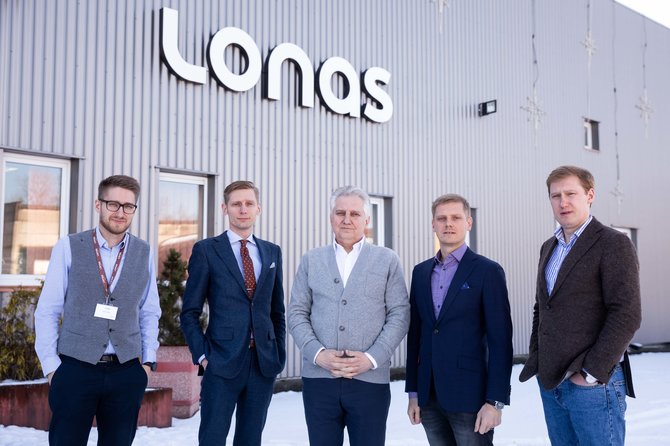
Interestingly, in the early days of the business its office was located on the first floor of Jakutis’ family home. However, the fact that their father was a businessman, was not something his children attached great importance to. Nor have they ever felt any pressure to take over the family business.
“The emphasis has always been on transferring the knowledge and experience as well as teaching us about money. Our parents used to give us a hundred litas each for Christmas, half of which we had to give to charity. When I was fifteen, us, older kids, received a thousand litas each and were taught about investment funds and shares. We set up our own portfolios so we could sell, gamble, lose our shares, burn the money completely or try investing it. These kinds of experiences were quite common when we were growing up,” explains Domas Jakutis.
“If in doubt, ask your mother”
Meanwhile Birutė Jakutienė is known as the coordinator of all things business and family. According to Birutė’s sons, even their father would often say: “If you are not sure what you want to do, ask your mother. Otherwise search for answers yourselves.”
“Our mother is always close by, she has known us our whole lives so she can really see what we are best at. My own direction was suggested by Mum, too. Thanks to her, I can fulfil myself in marketing. It gives me plenty to get stuck into – creativity, analytics and so much more. Everywhere you look, every project you take on – each day is so different here,” says Saulius Jakutis, Head of Marketing at Lonas.
His brother Domas agrees and adds that Birutė gently guided her sons towards the right direction: “Our Mum is the person who knows us best and was able to guide us accordingly. Having spotted my entrepreneurial skills, she suggested that completing business management studies would let me decide for myself where I could best fulfil my potential. But there was never any pressure, we never felt that our parents raised us to work for the family business or be involved in it with a view to take over the reins eventually.”
Admittedly, not all the brothers took their mother’s advice. Birutė’s oldest son Adas had been drawn to exact sciences since he was little, even considering the programming path. Even though Adas had the support of his mother, he later changed his mind and opted for management studies instead.
“As the eldest rebel in the family, I chose to take the exams which allowed me to apply for one specific subject at university. That’s how I ended up studying business administration,” says Adas Jakutis.
Saulius Jakutis
Age: 28
Education: BA in Economics and Data Analytics (ISM, Lithuania)
First role in family business: Marketing assistant (2016)
Current position: Head of Marketing at Lonas
Interests: board games, chess, video games, hiking, skiing, motorbikes
Liudas Jakutis
Age:36
Education: Secondary
First role in family business: Head of Sales and Business Development (2012)
Current position: Since end of 2016 – CEO of Gergama
Interests: work
All sons in family business within nine years
Adas Jakutis, the eldest of the four rebels in the family, was also the first one to join the firm in 2007, even if indirectly. Yearning for independence, Adas set up Loniukas, his first company, with financial help from his parents. The firm, which had a showroom in Šiauliai, was one of the wholesale partners of Lonas, venturing into e-sales in early 2008.
The second son to join the family business was Domas, who was offered to work in the management team of Lonas during his last year of college and be responsible for the firm’s showrooms. Having started part-time, Domas found himself looking after all sales a year later, taking on more and more responsibilities with time. Then in 2014 Domas was called in by his father who believed his son was very familiar with the business by then and offered him a chance to oversee the parent company Lonas. Domas was 25 at the time and slightly unsure about taking on this huge responsibility.
“Everything happened naturally. To start with, Dad was always beside me, we’d meet once a week and discuss any issues. But with time I needed less and less support, Dad would still approve contracts occasionally but eventually he was happy for me to take over everything,“ says Domas Jakutis.
His brother Liudas, meanwhile, first tried his luck in several independent businesses, trading in cars before joining the family enterprise in 2012. Initially he worked as a sales and business development manager. In late 2016 Liudas took on managing the manufacturing branch Gergama.
“We suspected we’d been buying raw materials at prices which were too high but there was nobody at the time to look into it more closely. Liudas’ input in this area is enormous. In the space of several years he made agreements with foreign suppliers, he negotiated the best terms and tightened up procurement procedures. This meant that Lonas had more opportunities for further development, creativity and marketing,” Domas Jakutis is generous with his compliments for brother Liudas.
The last one to join the family business was Saulius, the youngest of four brothers. His Lonas journey started in the last year of college, when he was employed by his brother to work as a part-time marketing assistant. After completing his studies, Saulius joined the marketing department in full-time capacity before being left on his own when the then head of marketing left the business. To start with, Saulius relied on his brother’s support and an external consultant. However, before long the young Jakutis was heading the marketing department independently.
All four brothers agree that the current structure of the business is based on their individual strengths.
“I have always liked organising events and socialising, being the soul of the party. I am also good at connecting people and motivating them. Having started in junior roles, I kept taking on more and more responsibility until I was offered a team leader position to bring everyone together, to connect them and achieve our goals. Adas was at the forefront of online trading, he was the one who’d started it all.
Saulius was into arts and music, he would make videos and edit them with his band. He did not start in a leadership position when he first joined the family business. But working alongside the best experts meant that Saulius could learn a great deal and eventually be given more freedom himself. The fourth brother Liudas is one of those people who could get quite insistent. But this can also be a positive thing – my brother is very determined, he is good at negotiating and really sticking to something, not letting it go,” says Domas Jakutis about his brothers.
All four men also told 15min that they were not particularly competitive with each other and did not try to split the family business amongst themselves.
The Lonas group of companies are managed by hired executives: Mindaugas Legas is in charge of Porolonas, while Loniukas, which has since transformed into a logistics and storage business, is the responsibility of Rosita Norkevičiūtė who came into this position last year.
“We are not glory-thirsty and do not intend on managing everything ourselves. We have long outgrown the confines of a small family business. We are now venturing into much more serious business affairs, often involving investments of millions of euro. So in order to manage and contain the business we need strong, competent leaders,” says Domas Jakutis.
Everyone’s contribution important
Each of the four brothers have had to prove their worth. For example, Adas is the person who started the e-commerce activities at Lonas. From the very beginning Adas realised that the product and the way the company represents itself are closely linked. This is why the behaviour and the presentation of the courier are very important.
“It was not a good look when an expensive item purchased for thousands of litas would be delivered by scruffy-looking lads smelling of cheap cigarettes. What does that say about the company? So we introduced a requirement for delivery teams to wear uniforms. We are also proud to be able to deliver the goods on the day and time agreed, even to the half hour indicated. Alongside the driver, an extra person is sent to help with the delivery,” explains Adas Jakutis.
And yet he admits that the start of e-commerce was challenging for a fifteen-year-old firm back then. Most of the team did not believe that people would buy mattresses on the internet, not like they purchase stationery, for example.
“The whole concept until then involved a customer physically trying the mattress, lying on it. Unpacking a mattress in the shop required a lot of effort. Customers would come in, see a mattress they liked, all wrapped up, take it and leave. Not many people believed anything good could come out of online sales,” recalls Adas Jakutis.
Subsequent years saw the rise in both the number of showrooms and the volumes of online sales. This growth also meant more vehicles, which prompted a decision last year to separate the e-commerce business from its logistics firm. Today Loniukas is a transport and storage firm while the e-commerce activities are consolidated under the Proho branch which was acquired in 2019 and which also manages the home accessory store Fėjos namai.
Saulius Jakutis believes that the current image of Lonas – from internal to external communication – is his input. While previously the company positioned itself as a mattress manufacturer, today it sells the entire “sleeping system”.
“Rather than simply talk about a mattress, we aim to sell the image and the interior solutions. This is a reflection of how things have changed,” says Saulius Jakutis, whose brothers also describe him as someone who questions decisions and changes proposed.
“At some point I started noticing that changes were being made and decisions were being taken too easily, so it made me want to slow things down a bit – to measure nine times before cutting,” explains Saulius Jakutis.
But it was Domas Jakutis who has fundamentally changed the company into the kind of business it is today. Having increased spending on marketing, Domas was the driving force behind the change in where mattresses were being sold. A decision was made that flagship showrooms, rather than ordinary stores, were the way to go, often requiring investment of over 100,000 litas each.
“Opening a showroom at Ogmios Miestas demonstrated that we can attract a different type of customer to our stores, such as architects and interior designers, which was not the case before. Step by step we refurbished all of our showrooms and by doing that we set the tone for the entire country, showing how displays should be done,” says Domas Jakutis, who has ambitious plans for the future of the business.
The CEO of Lonas is aiming to increase the company turnover from 16.5 million euro today to 50 million euro in five years’ time. Domas Jakutis believes that his company is on the verge of considerable growth with intentions to build new manufacturing facilities and expand into other Baltic states, their eyes also set on the Scandinavian market. However, developing too quickly could be damaging for the company.
“Lonas will soon mark 30 years since it was first established so our aim is to grow consistently. Appropriate foundations need to be laid so that any future development is successful and well-managed. The previous year has been really difficult for us, stretching all of our departments and teams. This is why we are now investing in improving processes, strengthening teams and getting ready for the next step,” explains Domas Jakutis.
Lessons learnt during previous crises
Adas Jakutis stresses that his father always has the last word on company matters. Kazimieras is also the person who can reconcile differing opinions as well as warn about the approaching crisis. Having himself been through the 2008 recession and the Russian economic crisis, the head of the family was able to prepare his children for the imminent challenges when the world started slowing down due to the COVID-19 pandemic last year.
“He was really worried because he’d already been through two crises, so our father thought there was a good chance we would witness a third one and it would be very tough,” says Adas Jakutis.
But his brother Domas adds that, contrary to other businesses, Lonas tried not to panic and wanted to keep their staff. Besides, having last year purchased an Estonian firm Dreamland, the Group were planning on refitting their showrooms. But when the pandemic hit, these plans had to be reconsidered.
“We were seeing a lot of panicking from other businesses, they were making people redundant. Some furniture makers let go hundreds of their staff. But we wanted to see what happens first, to wait a little and not start cutting salaries immediately,” explains Domas Jakutis, adding that the only people who saw a 30% pay cut were the company directors and department heads. However, their salaries returned to pre-pandemic levels within two months.
With the panic over and sales rapidly increasing, the company faced a different challenge – managing this unexpected growth.
And yet it was the end of 2020 that proved to be the most difficult period for Lonas. A COVID-19 break out in one of the workshops meant that around 700 orders had to be pushed back during the busy Christmas period. Domas Jakutis stresses that Lonas prides itself on its ability to always honour the agreed delivery time. However, this was a completely different situation.
“We contacted each of our customers to inform them that their orders would be delayed and gave the option to cancel their purchases. We found ourselves in a situation where negotiating was no longer feasible so we proposed new delivery dates. We all put a lot of effort in managing the situation and customer dissatisfaction. But I am pleased to say that majority of our clients decided to wait,” remembers Domas Jakutis.
A family affair
Kazimieras Jakutis is glad his sons have taken over the family business and does not interfere with their relationships. However, there is one rule the founder of Lonas has introduced. It stipulates that his daughters-in-law are not part of the family business. This decision was brought about by Kazimieras’ early experiences in business involving family members.
“There was a pause at one point. Things happen, people change so we had to part ways with some of our relatives. Today these relationships are back to normal but back then we had to take some difficult decisions. This is why we now have very clear boundaries. Not because people don’t have enough skill or talent but so that we could avoid painful repercussions on family relations which could potentially be irreversible.
The four of us know each other better than anyone could. We have disagreements, of course, but they don’t last long. We have a different relationship with our parents but we are all very tolerant and can openly express our opinions as well as reconcile after any arguments. But with our other halves things could go the opposite way and any damage to these relationships may become irreparable,” says Domas Jakutis.
Sixty-year-old Kazimeras has decided that he should retain at least 70 per cent of company shares until he turns 70. But the rest of the business is not up for splitting. Instead, Kazimieras’ sons have an option of buying parts of the business at market value. The good news is that the structure of the firm is expanding every year so the brothers are able to increase their earnings, too. On the other hand, the increasing value of the business means that shares are also becoming more expensive.
“It is a vicious circle: if you purchase some shares but the business does not do well – that’s a waste of money,” laughs Adas Jakutis.
There is nothing personal amongst the brothers when other transactions are being conducted, either. For example, if one company borrows from another, or provides a service or family members need to borrow from each other – all of this is done under market conditions, i.e. contracts are signed, interest is paid, etc.
“For us it is very normal and nobody is taken by surprise. This way any personal feelings are eliminated and there is no space for interpretations. When conditions are very clear, you can handle the situation so much better,” says Domas Jakutis.
As to who will manage the business in the future – hired executives or the children of Jakutis siblings – is yet to be seen as their kids are still very young. Besides, the brothers cannot know if their children will even want to do this or will be competent enough to oversee the family business.
“The business needs to be managed by someone strong and determined. If our children want to take over managing the company but have no competencies necessary for that, I believe we are confident enough as leaders to take risks and find suitable people to steer the company,” summarises Domas Jakutis.

